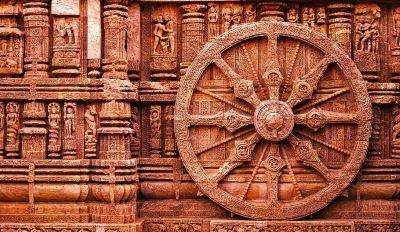Context-
The ancient concept of a welfare state finds its roots in both modern formulations and ancient civilizations. Otto von Bismarck's initiatives in the 1880s are often credited with establishing the first modern welfare state in Germany, but ancient India also harbored similar ideals. The socio-political thought of ancient India, notably evident in teachings from the sixth century BCE, emphasized the state's responsibility to protect the well-being of its citizens.
The Notion of Welfare and State in Ancient India:
Ancient Indian doctrines, both religious and secular, underscored the importance of individual and societal well-being. Texts like the Dharmashastras emphasized the pursuit of moral behavior, wealth, worldly pleasures, and salvation (Dharma, Artha, Kama, and Moksha) for a meaningful life. Gautam Buddha advocated the Middle Path, promoting moderation and salvation. The emergence of territorial states in the sixth century BCE led to the rise of urban centers and socio-economic stratification. Buddhist and Jain texts discuss the creation of states as a social contract, akin to concepts proposed by modern political thinkers.
Gautam Buddha's Socio Political Recommendations:
In the sixth century BCE, Gautam Buddha advocated measures for uplifting the living conditions of the people, emphasizing the king's responsibility in promoting the well-being of the citizens. Buddhist philosophy introduced the Noble Eight-fold Path, a middle path between extremes, aiming to alleviate suffering and achieve salvation. Beyond spiritual interpretations, Buddha recognized the link between material well-being and overall happiness, laying the foundation for the state's role in poverty eradication.
Kautilya's Arthashastra and the Ideal King:
Kautilya, also known as Chanakya, served as the chief minister of the Mauryan emperor Chandragupta Maurya. His Arthashastra, a treatise on statecraft, provides normative guidelines for an efficient administration. The ideal king, as per Kautilya, has three-fold duties: raksha (protection), palana (maintenance of law and order), and yoga-kshema (welfare). The treatise emphasizes economic well-being through various productive activities under state control and highlights the delicate balance between state resources and the welfare of the people.
Kautilya's Recommendations for Economic Prosperity:
Arthashastra advises kings to engage in productive activities such as settlement of virgin land, building irrigation facilities, opening trade routes, and exploiting natural resources. The text recognizes that a flourishing economy benefits both the state and its people. Kautilya encourages the king to provide support to new settlers, offering seeds, cattle, tax concessions, and loans to boost agriculture. The minimum wages for laborers are specified, demonstrating a pragmatic approach to social and economic welfare.
Kautilya's Paternalistic Ideal and Justice System:
Kautilya sets a paternalistic ideal for the ruler, stressing that the kingdom prospers when the king regards his subjects with the same concern as a father regards his children. The text outlines rules for the protection of vulnerable segments of society, including orphans, the aged, and the infirm. Kautilya's justice system includes measures against extortion, fraudulent practices in trade, and humane treatment of slaves.
Kautilya's Approach to Law and Order:
Maintaining law and order is a primary responsibility of the state, according to Arthashastra. The treatise devotes an entire book to the suppression of criminal activities, prescribing punishment for criminals and anti-social elements. Kautilya emphasizes the just use of coercive power (danda) by the king to protect the subjects and enable the weak to stand against the strong. However, he cautions against unjust use, which could lead to discontentment or revolt.
Ashoka and the Propagation of Dhamma:
Emperor Ashoka, the Mauryan ruler, focused on the well-being of his people through the propagation of Dhamma. His rock and pillar edicts reveal his commitment to welfare activities, including planting medicinal herbs, digging wells, and providing medical care. Ashoka appointed dhamma mahamatras to spread the message of Dhamma and ensure the welfare of prisoners, the afflicted, and the aged. He aimed to create an atmosphere of concord among people of different religious communities.
Ashoka's Ideal of Kingship and Dhamma:
Ashoka's ideals of kingship revolve around ensuring the welfare and happiness of all beings. He acknowledges a debt to all living beings, which he seeks to discharge through the promotion of Dhamma. Ashoka's inscriptions highlight his concern for people's welfare, urging them to order their lives according to the principles of Dhamma for happiness in this world and the next.
Epigraphical Testimonies of Mauryan Welfare Activities:
Inscriptions from Sohgaura, Mahasthan, and Girnar provide additional evidence of the Mauryan state's welfare activities. The Sohagaura inscription records orders to distribute food during droughts, while the Mahasthan inscription details measures taken during famines, including loans and distribution of paddy. The Girnar inscription highlights the construction of the Sudarshana Lake, showcasing the state's commitment to famine relief and irrigation facilities.
Conclusion:
Ancient Indian sociopolitical thought, as reflected in the teachings of Gautam Buddha, Kautilya's Arthashastra, and Emperor Ashoka's Dhamma, lays a robust foundation for the concept of welfare state. The emphasis on economic prosperity, justice, law and order, and the well-being of all citizens demonstrates an early recognition of the state's responsibility in promoting the welfare of its subjects. The Mauryan state's tangible efforts, as evidenced by inscriptions and historical records, further solidify the notion that the welfare state concept has ancient roots in India. In navigating the delicate balance between state resources and the welfare of the people, these early Indian thinkers provided enduring principles that continue to influence modern governance.
|
Probable Questions for UPSC Mains Exam-
|
Source- India Foundation







